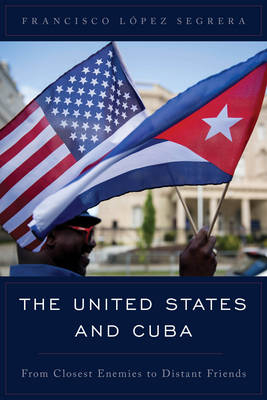
The United States and Cuba
From Closest Enemies to Distant Friends
Seiten
2017
Rowman & Littlefield (Verlag)
978-1-4422-6721-3 (ISBN)
Rowman & Littlefield (Verlag)
978-1-4422-6721-3 (ISBN)
This timely book draws on the historic restoration of diplomatic ties between Cuba and the United States in 2015 to offer a Cuban perspective on past and future relations. Comparing the differing perceptions shaping policies on both sides, the author analyzes the changes that led to the opening and assesses the prospects for full normalization.
This timely book takes the historic restoration of diplomatic ties between Cuba and the United States in 2015 as the point of departure for a Cuban perspective on future relations. Tracing the history of the long and contentious relationship, Francisco López Segrera analyzes the pre-revolutionary and Cold War periods as well as more recent changes within each nation and in the international environment that led to the diplomatic opening and the abandonment of regime change as the goal of U.S. policy. He considers factors such as the declining influence of hard-line Cuban exiles in the United States; almost universal calls from Latin America, Europe, and other U.S. allies for constructive diplomatic engagement; and the economic restructuring underway in Cuba following the crisis of the “Special Period” triggered by the collapse of the Soviet Union. The author also identifies conditions favoring further progress, as well as outstanding issues that may constitute barriers—especially the blockade, U.S. demands for a Western-style democracy in Cuba, and its refusal to return the Guantánamo naval base to Cuban sovereignty. Comparing the differing perceptions shaping policies on both sides, López Segrera weighs the steps that will be necessary for the two countries to move toward full normalization.
This timely book takes the historic restoration of diplomatic ties between Cuba and the United States in 2015 as the point of departure for a Cuban perspective on future relations. Tracing the history of the long and contentious relationship, Francisco López Segrera analyzes the pre-revolutionary and Cold War periods as well as more recent changes within each nation and in the international environment that led to the diplomatic opening and the abandonment of regime change as the goal of U.S. policy. He considers factors such as the declining influence of hard-line Cuban exiles in the United States; almost universal calls from Latin America, Europe, and other U.S. allies for constructive diplomatic engagement; and the economic restructuring underway in Cuba following the crisis of the “Special Period” triggered by the collapse of the Soviet Union. The author also identifies conditions favoring further progress, as well as outstanding issues that may constitute barriers—especially the blockade, U.S. demands for a Western-style democracy in Cuba, and its refusal to return the Guantánamo naval base to Cuban sovereignty. Comparing the differing perceptions shaping policies on both sides, López Segrera weighs the steps that will be necessary for the two countries to move toward full normalization.
Francisco López Segrera was permanent secretary and interim president of the Cuban Commission of UNESCO and deputy director of the Institute of International Relations, Havana, Cuba, where he is adjoint titular professor.
Acknowledgments
Introduction
Chapter 1: Historical Roots of the Cuban-U.S. Conflict
Chapter 2: Mutual Perceptions (1959–2015)
Chapter 3: From Close Enemies to Distant Friends
Conclusion
Chronology
| Erscheinungsdatum | 23.04.2017 |
|---|---|
| Reihe/Serie | Latin American Perspectives in the Classroom |
| Verlagsort | Lanham, MD |
| Sprache | englisch |
| Maße | 144 x 218 mm |
| Gewicht | 290 g |
| Themenwelt | Geisteswissenschaften ► Geschichte ► Regional- / Ländergeschichte |
| ISBN-10 | 1-4422-6721-6 / 1442267216 |
| ISBN-13 | 978-1-4422-6721-3 / 9781442267213 |
| Zustand | Neuware |
| Haben Sie eine Frage zum Produkt? |
Mehr entdecken
aus dem Bereich
aus dem Bereich


